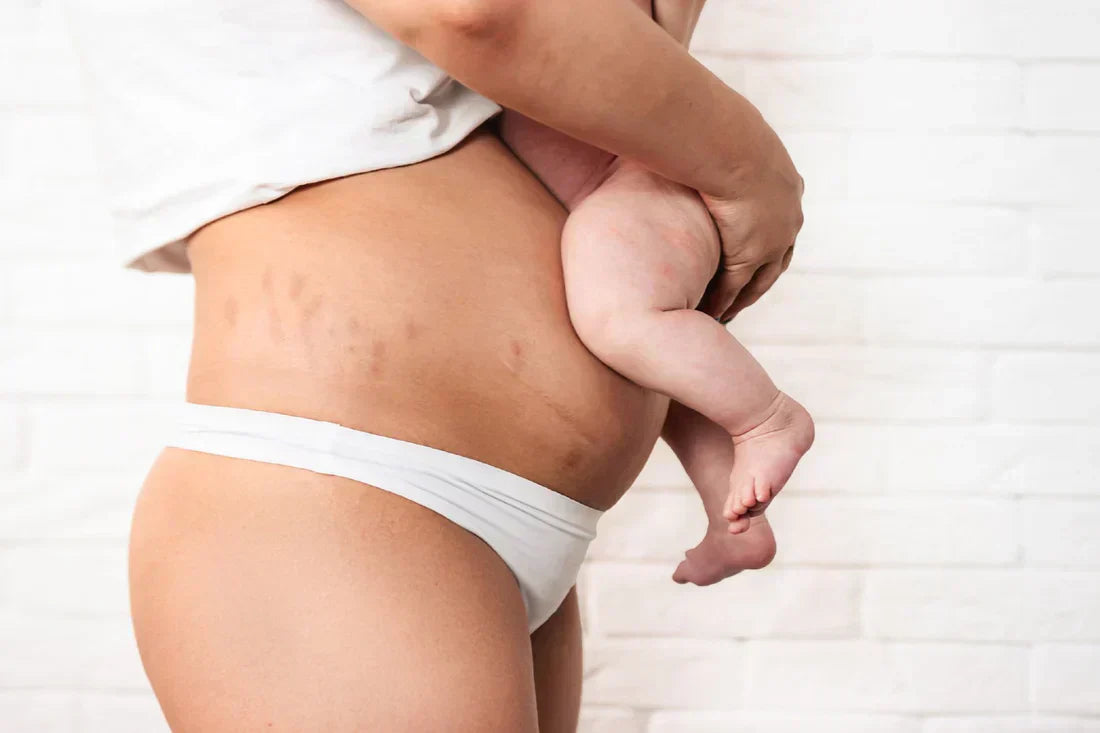
Pregnancy changes nearly everything in your body, but the shift that catches most moms off guard is what happens with hormones after birth. One minute you might feel teary, the next restless or foggy. Maybe your hair is shedding in clumps or your mood flips within hours. It can feel unsettling, but most of it comes back to your hormones finding a new rhythm.
Every recovery is unique, but there are common patterns most moms experience. Knowing what to expect and when can take away some of the mystery and remind you that what you are going through is not only common, it is normal.
What Happens to Your Hormones After Birth
While you are pregnant, estrogen and progesterone climb to sky-high levels. Right after delivery, they crash, which signals to your body that pregnancy is over.
In their place, oxytocin and prolactin step in. Oxytocin is the “bonding hormone” that helps with milk let-down and feelings of calm. Prolactin helps your body make and maintain milk. These changes can feel like a blur, but understanding what is happening inside your body can make those early weeks a little less overwhelming.
The First 3 Months: A Rollercoaster of Change
The first weeks after birth bring the biggest rollercoaster. With estrogen and progesterone staying low, night sweats, mood swings, and skin changes are common.
If you are breastfeeding, oxytocin and prolactin rise to keep up milk supply. If not, they drop back down within a couple of weeks. Many moms feel extra weepy or emotional here. The “baby blues” are very normal and usually ease within two weeks. If sadness lingers or feels heavy, that is a sign to reach out for support.
By around three months, your body is still finding its balance. Estrogen often stays low while breastfeeding, which can affect mood, cause dryness, or add to pelvic floor discomfort. Around this time, hair shedding often starts too. It can feel scary, but it is temporary and usually improves within a year.
3–6 Months: Hormones and the Return of Your Cycle
Between three and six months, hormones start to settle, but what happens depends on breastfeeding. If you are not nursing, estrogen and progesterone often return to pre-pregnancy levels and your cycle may start again. If you are, prolactin stays higher and can hold ovulation off.
Some moms get their first postpartum period here, others much earlier or much later. Cycles may be irregular at first, which is completely normal. If you are not breastfeeding and your period has not returned by three months, it is a good idea to check in with your provider.
6–12 Months: Finding Your Rhythm Again
By around six months, many moms notice hormones finding more of a rhythm. Estrogen and progesterone usually cycle again, and periods may feel more predictable if you are not breastfeeding. If you are still nursing, prolactin stays a bit higher but usually eases as your baby starts solids.
This stage often feels like a slow return to yourself. Energy may lift, though brain fog and fatigue can hang around. Relaxin, the hormone that loosened your joints for birth, can stay in your system close to a year, which is why your body may still feel different.
When Hormones Feel Out of Balance
Some ups and downs are expected, but sometimes hormones feel like too much. Signs things might be out of balance include:
- Ongoing fatigue
- Low libido
- Mood swings that do not improve
- Brain fog or memory struggles
- Weight changes that feel difficult to manage
Daily life with a baby is already exhausting, which makes it easy to dismiss these symptoms. If they are sticking around or making daily life hard, it is worth checking in with your provider. Support exists for postpartum depression and hormone imbalances, and you do not have to push through it alone.
Common Questions About Postpartum Hormones
When do postpartum hormones go back to normal?
For many people, hormones begin to stabilize around six months, but breastfeeding, sleep, and individual differences can stretch that timeline.
Can breastfeeding delay my period?
Yes. Prolactin levels rise with breastfeeding, which can delay ovulation and postpone your period.
Why am I losing so much hair postpartum?
Extra hair often begins to shed around three months as estrogen drops. Shedding is temporary and usually improves within a year.
Supporting Yourself Through the Ups and Downs
Hormones are only part of recovery. What helps most is steady support: nourishing meals, rest when you can, gentle movement, and leaning on people who care.
Supplements can be one piece of this care. Our Postpartum Recovery Bundle was created to support new moms with nutrients for energy, mood, and overall healing. It is one small way to give your body extra support during this season.
Most importantly, be patient with yourself. Your body just did something extraordinary. Recalibration takes time, but each stage passes and balance really does return.


